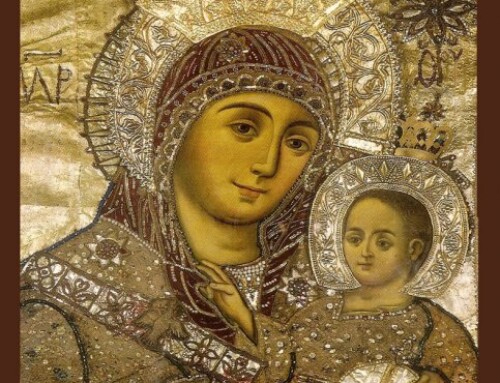Word Magazine March 2001 Page 16/21
PRAYING FOR THE SAKE
OF THE OTHER
By Very Rev. Jason Delvitto
Some time ago I was involved in a discussion group whose members were contemplating the power of prayer and how intercessory prayer has helped change the lives of so many people. Most of us agreed that prayers offered on behalf of others has sustained hope and faith throughout the world in truly wondrous ways for not only those being prayed for, but for those offering the prayers. We also discussed the fact that there have even been “studies” conducted within the medical world on whether there can be any observable, beneficial effects of intercessory prayer being offered for patients who are recovering in coronary care units within hospitals. (cf. Article in the October issue of the “Archives of Internal Medicine,” October 25, 1999) The implication in these studies indicate that people do benefit from prayer which is a self-evident reality for many people of faith.
During our discussion, one member of our group, exhibiting a certain sense of skepticism, challenged us with the following thought with regard to the efficacy of prayer, especially intercessory prayer. “There can be no doubt that countless prayers are being offered daily throughout the world by sincere people of good faith praying within their own religious traditions. Even with all of these prayers being offered continually, the world still suffers and its condition looks bleak. Even a quick survey of our immediate surroundings reveals familial strife, illness and death among the young and innocent, injustice, hate, envy and strife, not to mention natural disasters which bring untold suffering to countless individuals. So where are the effects of all of these prayers? The world’s condition remains as it is despite all of these prayers.” Following a moment of reflection on the skeptic’s challenging thought, one member of our discussion group presented us with this response: “Indeed it is true that prayers are being offered to God at all times by many people of faith throughout the world. The world is as it is, not despite the prayers of so many, but because of the prayers of so many. Obviously, people don’t pray for suffering to befall anyone, that would be horribly offensive and ungodly. It is not by our prayers that we suffer, but it is by and through our prayers that we offer our sufferings to God. It is through the prayers on behalf of the world offered by people of faith and ultimately, by the mercy and grace of God, that this world still spins on its axis and life flourishes. It is by the prayers of the saints that God sustains the universe. This is precisely why the world is in such need of prayer. What would this world be like, if those people of good faith ceased to pray? Do you think that things look bleak now? Imagine our world without prayer, what a frightening thought that would be.”
One point that all of the members of our discussion group could agree on is that the act of prayer, especially on behalf of others in our lives, is a universal act of people of faith. Intercessory prayer appears to be the natural fruit of those faithful individuals, living within the human condition broken broken and compromised by the effects of sin, who out of a loving and compassionate heart, reach out to God in fervent supplication for the sake of the other.
Throughout the Holy Scriptures, within the Liturgical tradition, and as exemplified within the lives of the faithful saints and witnesses of the Orthodox faith throughout the ages, we find countless examples of people who, with bold and loving hearts, approach God in prayer not only for themselves, but for all of humanity, indeed, for the entire world. Indeed, it is Our Lord Jesus Christ Himself who is The Intercessor for all and it is in and through him that we, having interiorized Him, pray for all as he continually makes intercession for us. It is through Christ that we have boldness to approach the heavenly God and to call him “Father,” as we pray prior to the Lord’s Prayer in celebrating the Divine Liturgy. Indeed, it does take a certain boldness not only to approach God and to offer prayer, but to force ourselves to prayer for the other in our life, especially for those we have permitted to cause us suffering, pain and grief in our lives and who consider themselves our enemies. It takes a compassionate and loving heart to have the boldness to pray for the “difficult” ones in our lives. Yet this is precisely what Christ commands us to do. It is up to us, through repentance and a sincere desire to receive from God that sublime gift of the ability to offer prayer for others with a compassionate and loving heart purified by the Divine Grace of the All Holy Spirit.
St. Isaac the Syrian speaks of the compassionate and loving heart that burns with love for all of creation. It is in this spirit of the heart which is on fire for God and his creation that offers prayer for the sake of the other: “When a man with such a heart as this thinks of the creatures and looks at them, his eyes are filled with tears because of the overwhelming compassion that presses upon his heart. The heart of such a man grows tender, and he cannot endure to hear of or look upon any injury, even the smallest suffering, inflicted upon anything in creation. Therefore he never ceases to pray with tears even for the dumb animals, for the enemies of truth and for all who do harm to it, asking that they may be guarded and receive God’s mercy. And for the reptiles also he prays with a great compassion which rises up endlessly in his heart, after the example of God.” (Ascetical Homilies 71 (74), tr. Holy Transfiguration Monastery, pp. 344-5). St. Isaac even mentions prayer for the fallen demons.
Intercessory prayer “in behalf of all and for all” is a deliberate and decisive act of those individuals who have been baptized into Christ and who present themselves before God in a spirit of love, compassion and confidence in God’s divine mercy for the sake of the other. It is the fervent prayer that we offer to God for the sake of all in this world, especially those within the community of the Church, both the living and those who have fallen asleep in Christ. Our practice of praying for those who have died is deeply rooted in the ecclesial consciousness of the faithful as the supreme act of love, for in Christ there is no death. It is the Lord Jesus Christ himself and the Holy Spirit of God who pray within us. — Christ is the intercessor and those who interiorize him intercede before God as he intercedes for us.
Intercessory prayer is ultimately an expression of love and compassion for all that exists.
We may, at this point, consider what is accomplished or rather realized through the act of intercessory prayer. First of all, when we pray on behalf of others, both those who are alive and who are fallen asleep, we acknowledge ourselves as creatures of God and that he is the source and goal of all existence. Our lives depend upon God and with this realization, we firmly believe and affirm that it is only through him and by his will that what and who we pray for we place in his loving care and providence. Secondly, through the act of intercessory prayer, we acknowledge and participate in a Godly fellowship with the Holy Theotokos and Ever-Virgin Mary, along with the countless saints, martyrs and heavenly hosts who glorify God and who continually pray on our behalf in the heavenly kingdom. Our heavenly citizenship is confirmed and realized as we pray in the company of the saints. Thirdly, our bond of love is strengthened and our solidarity in the Spirit celebrated with our brethren of faith within the life of the Church as taught to us by St. John of Kronsdadt:” … we are all children of the Heavenly Father. When you pray, endeavor to pray more for others than for yourself alone, and during prayer represent vividly to yourself all men as forming one body with yourself, and each separately as the Body of Christ, for we are members one of another. Pray for all as you would pray for yourself, with the same sincerity and fervor; look upon their infirmities and sicknesses as your own, their spiritual ignorance, their sins and lusts, as your own, their temptations, misfortunes and manifold afflictions as your own. Such prayer will be accepted with great favor by the heavenly Father, the most gracious, common Father of all, whose boundless love embraces and preserves all creatures” (The Spiritual Counsels of St. John of Kronsdadt, SVS Press, reprinted 1981, p. 14). Through the loving act of intercessory prayer, St. John of Kronsdadt tell us that our brothers life becomes our own. We take on a Godly responsibility for the sake of the lives of our brethren being responsible to them as fellow servants of God. As we know in the evangelical imperative of Orthodox spirituality, our fervent prayer is brought to fruition through the practice of love and mercy in the name of Christ Jesus (Matthew 25). Fourthly, in a society plagued by self-centeredness and excessive ego gratification, the act of intercessory prayer draws us out of ourselves to the other; the other being God and our neighbor. Intercessory prayer is a selfless act on our part although we do receive benefits from such prayer – all prayer done in a spirit of faith and love. Finally, when we offer intercessory prayer, we are actualizing the baptismal grace we have all received from God and the evangelical command to love one another. Prayer is an act of love and it is through prayer and a prayerful life in word and deed that God is glorified. So the next time that you offer prayers for the sake of the other, either in your personal prayers or assembled as the Body of Christ through the Liturgy, know that your prayers resound with the prayers of countless saints and holy people of God in the heavens and on the earth praising and glorifying the Author of life.


